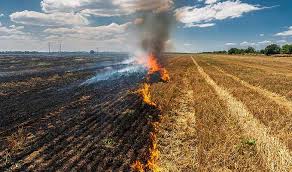Holistic approach: On dealing with North India’s stubble burning
India needs a multi-pronged strategy to deal with stubble burning.
The Supreme Court of India has broached the possibility of prosecuting farmers, caught setting fire to their fields, to prepare for winter sowing or rabi crop. ‘Stubble burning’ is a major contributor to air pollution in Delhi, Uttar Pradesh, Punjab and Haryana, particularly in October and November, when the southwest monsoon has receded and adverse meteorological conditions trap toxic particulate matter emissions from vehicles, industry, garbage burning and agricultural waste. While the causes and the ways to reduce particulate matter pollution from agriculture are known, the efforts by the Centre to tackle the long-standing problem have been half-hearted. The creation of the Commission for Air Quality Management (CAQM), a central body with the power to reach out across the borders of Punjab, Haryana, Delhi, Uttar Pradesh and Rajasthan, was a positive step and an acknowledgement that air pollution in one State cannot be tackled without the cooperation of others. However, the four-year-old statutory body has failed to exercise its powers in a manner that is independent of political pressure. Take the example of its recent order to ban the sale of petrol and diesel in the National Capital Region to ‘end-of-life’ vehicles, from July 1. A public outcry in Delhi and its political leaders — largely on technical grounds — and the Court’s intervention, forced its implementation to November this year, that too beginning with parts of the NCR that are not a part of the Delhi municipalities. In stubble burning too, the CAQM has not been able to impress upon the judiciary that stubble burning was due to recalcitrant farmers, limited enforcement by Punjab and Haryana and the structure of agricultural economics that left the average, debt-ridden farmer with little choice. In recent years, it has emerged that Punjab has been claiming a reduction in farm fires when it was in fact increasing. The CAQM chose not to disclose this.
In the absence of a transparent mechanism to evaluate and address an issue and being cowed down by imagined political repercussions, it is not surprising that suggestions such as to “jail farmers” to act as a deterrent to others are being bandied about. While no section of citizens — farmer or industrialist — can be considered to be above the law, creating better incentives, enforcing existing laws and being transparent about what is realistically achievable are more advisable steps than ‘carrot and stick’ approaches.
